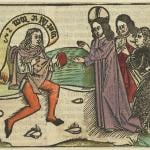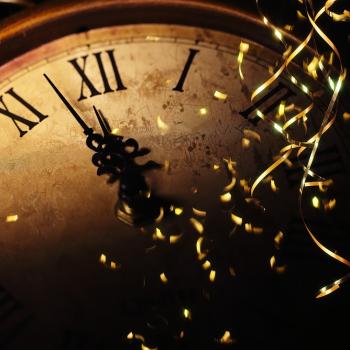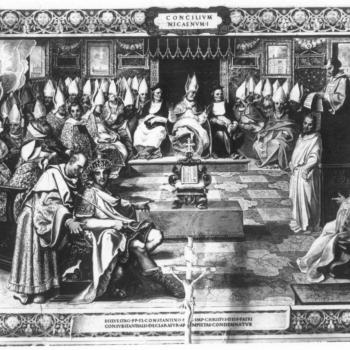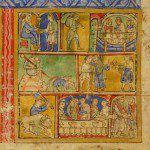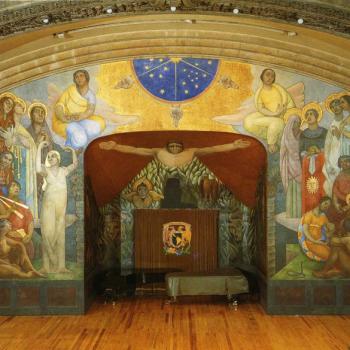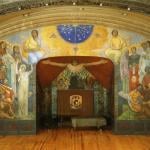
Ever year on September 1st I like to say, “Happy New Year.” This is because it is the beginning of the ecclesiastical year in the Byzantine tradition. Of course, it is not the only day I say this because I also say it on the first of January. Sometimes, I do so on other days, such as with the Spring Festival (Chinese New Year). There is something exciting about a new year. There is a sense that with the newness that has come upon us, the corruption of the past can be put aside. There is hope that with the new year ahead, things can and will change for the better. This is why so many people make resolutions for the new year. It is all about hope, a hope which has yet to be squashed.
New Years’ celebrations represent one of many ways which we mark the passing of time. Time is something which we experience in ways which are beyond our conscious comprehension; we try to find a way to experience it, to understand it, by making various conventions and labels concerning the passing of time, the various ways which we can apprehend it, hoping that by doing so, we will better understand it and its significance for us. No matter how much we do so, there always remains something mysterious about time. We take what we apprehend, we take the conventions we make about it, and try to develop all kinds of theories, some more substantial than others, about what it is and about how it works, and in doing so, we might create some sort of understanding about it which helps us find meaning for our experience of time, but none of them are comprehensive, as they all leave us wanting.
The way we engage time shows us how we can apprehend something which is mysterious and give labels to it in order to try to better understand it while still acknowledging the fact that the reality we apprehend transcends our conventions used to discuss it. This transcendence is what allows us to create many different conventions to explain time to ourselves, conventions which point to the truth, but which, when put side by side, appear to contradict each other, as, for example, is seen in the way we can have many days which represent the start of a new year. In this way, we learn not only the limitations of conventions, but find out why we must not always let such apparent contradictions get in the way of the truth which is being represented by the conventions.
As we examine the concept of time many questions arise, such as: does time really exist, does the division between past, present and future represent real or only logical distinctions, and does the past and future exist in the same way the present exists. Our experiments with time shows us that time does not seem to remain constant, that the speed of something affects its relationship with time, so that, as the theory of relativity famously posits, we find those moving close to the speed of light will age quite differently from those who are not. This, once again, gives us all kinds of questions concerning the nature of time, and presents to us more ways in which our conventions or experiences with time seem to represent contradictions.
Time is mysterious, but our examination of time shows us how mysterious things can contain elements which we know or apprehend, and other things which we cannot, making it impossible for us to create conventions which comprehend the phenomena under discussion. Once again, this is what leads us to create many different conventions for the same reality, conventions which are true insofar as they point beyond themselves, but can quickly lead to confusion when someone tries to bring them all together into one unified theory. This is exemplified in the way we can talk about secular and sacred time and the distinctions between the two. Sacred time has its own constructs, its own standards, its own calendars, while sacred time not only has its own, the constructs used to establish sacred time are not always universal for people from the same religious faith tradition. September 1st is the beginning of the new ecclesiastical year for those who follow the Byzantine tradition, while the Western tradition has a more fluid date for the start of its ecclesiastical year, as it begins on the first Sunday of Advent. Not only does this lead to Catholics having differing representations of sacred time, we find that sacred time can and does have fluidity connected with it based upon the way the New Year is moveable in the Roman tradition or in the way the Byzantine tradition, and most of Christianity, has Pascha (Easter), as a movable feast. What is interesting with all of this is that even something which is said to be fluid can and will have an objective element to it, and indeed, that objective element requires such fluidity for it to be properly presented.
It is because I find myself experiencing the New Year, the new ecclesiastical year, differently from Roman Catholics, that I have come to ponder the notion of time and how our relationship with it reveals to us many truths about the transcendent truth and our apprehension of it. I see it affirms the way I often discuss conventions concerning the divine reality, and how we must not confuse our conventions with absolutes. They are pointers to the truth, capable of performing their duty so long as we recognize that they are pointing to the truth which lies beyond the words use. Human language is good, and it can help us apprehend all kinds of truth, but it is also a limited tool, and we must accept that limitation if we are to use language properly. If we don’t, we will end up misunderstanding the conventions, which is, to be sure, what often happens when we talk about God.
Today is the New Year. It might not be the New Year for you, but it is for me. It is time for me to once again look at myself and to see what changes I can make. To make that possible, I with many others, reach out to God, asking for God’s help:
O Creator and Master of time and the ages, Triune and Merciful God of all: grant blessings for the course of this year, and in Thy boundless mercy save those who worship Thee and cry out in fear: “O Savior, grant blessings to all mankind!” (Kontakion for September 1).
* This Is Another Post From My Personal (Informal) Reflections And Speculations Series
Stay in touch! Like A Little Bit of Nothing on Facebook.
If you liked what you read, please consider sharing it with your friends and family!
N.B.: While I read comments to moderate them, I rarely respond to them. If I don’t respond to your comment directly, don’t assume I am unthankful for it. I appreciate it. But I want readers to feel free to ask questions, and hopefully, dialogue with each other. I have shared what I wanted to say, though some responses will get a brief reply by me, or, if I find it interesting and something I can engage fully, as the foundation for another post. I have had many posts inspired or improved upon thanks to my readers.


